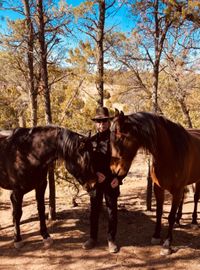Equine Assisted Psycho-Therapy
Metaphoric Memories
You can’t lie to a horse, and a horse won’t lie to you. A horse is emotional truth.
When It's Used
Equine Assisted Psychotherapy is valuable to both adults and children, generally those over the age of 6. It has been proven to treat a number of conditions, including; ADHD, addiction, autism, PTSD, anxiety, and depression. It is also recommended to help address common life challenges such as grief or low self-esteem.
What to Expect
During an Equine Assisted Therapy session, the client will typically engage in basic caretaking activities with the horse under the direction of the equine specialist Dana Silkiss. Common examples include grooming, feeding and leading the animal.
They may also take on more complex activities, such as creating a basic obstacle course for the horse and guiding them through it. (Riding the horse is not often a component of mental health treatment, but may occur during Equine Assisted Physical Therapy or Occupational Therapy.)
Afterward, the therapist and the client will usually discuss what occurred, what was learned, and what behaviors or emotions they might target in their next session with the horse.
How It Works
Because horses have long been domesticated and live alongside humans, it is known that they are especially attuned to human’s emotions and nonverbal signals. While engaging in activities with the horse, the client will attempt to recognize how the horse’s behaviors might be due to their own emotional signals - a client who is angry or anxious, for example, may see the horse pull away or otherwise respond negatively. This “mirroring” process is thought to help the client identify what they’re feeling and potentially modify their emotions for the better - all in a nonjudgmental environment. Equine Assistant Therapy also promotes the practice of mindfulness and focusing on the present moment, when the client is interacting with the horse.
Because horses are large, powerful, and may be intimidating to many people, engaging with them in a supervised environment is thought to help anxious individuals face their fears and vulnerability in a safe space.
Indeed, simply interacting with the horses and successfully guiding them through challenges is beneficial for eliminating anxiety and improving self-esteem. Over time, many clients form a bond with the horse(s) they work with, which is theorized to foster empathy and build trust, especially among clients who have been traumatized in some way. Learning to interact with a horse calmly and safely is helping individuals, particularly children, who struggle with impulse control or hyperactivity.
Two feet move your body, four feet move your soul. | |
Dana Silkiss
Via Per Barza 24 21021 Angera (VA)
Italy
Phone +39 347 783 5149 Whats-App +1 (570) 250 6173 |

